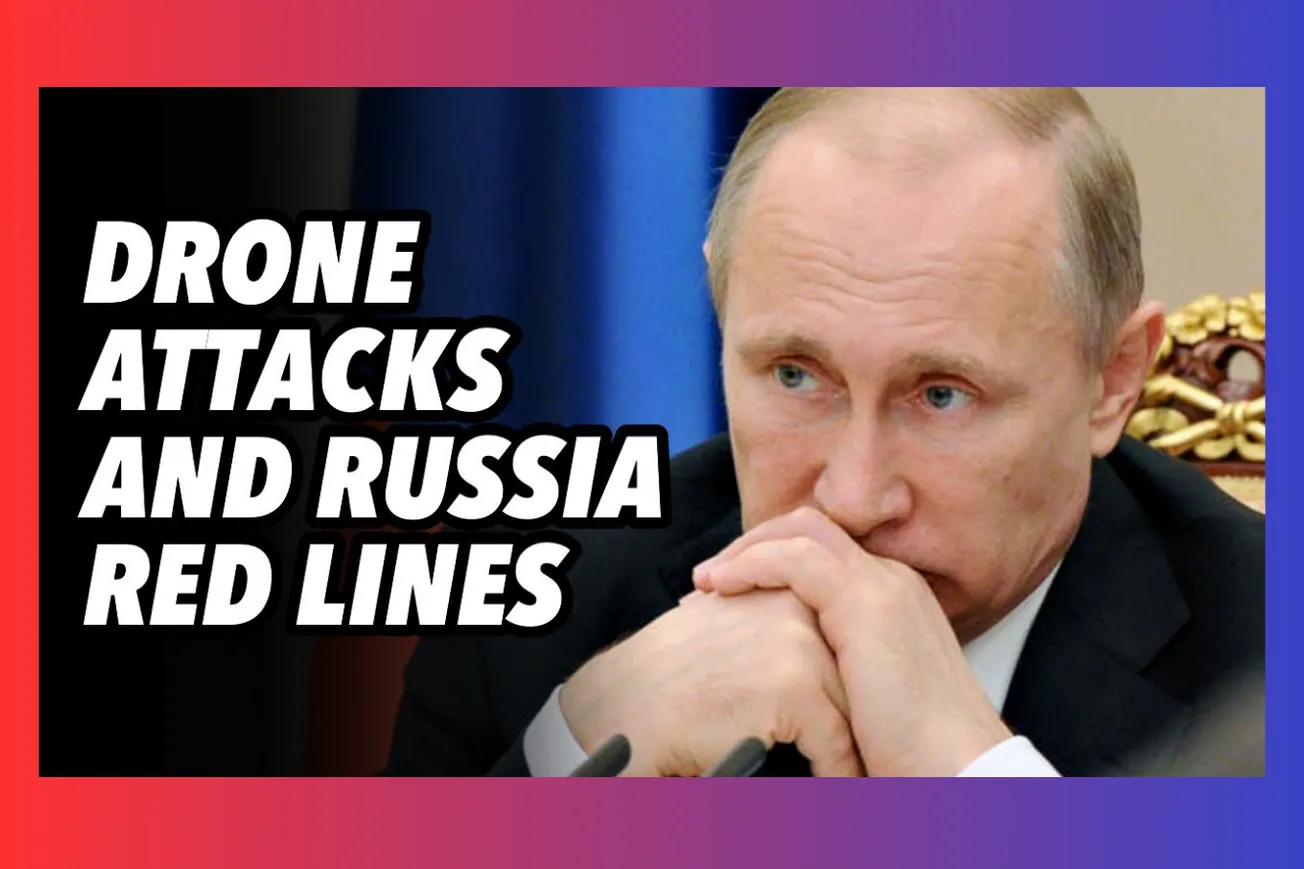Table of Contents
Weekend drone attacks on Russian strategic bomber bases expose Western escalation limits while revealing Trump administration's knowledge of classified operations.
Key Takeaways
- Ukrainian drone attacks struck multiple Russian air bases including strategic bomber facilities in Siberia and Arctic regions
- Russia unlikely to treat bomber attacks as red line crossing since aircraft were used in conventional Ukrainian operations
- Operation required 18-month planning period making duplication difficult and revealing Ukrainian intelligence networks
- Trump's Truth Social posts suggest advance knowledge of "Operation Spiderweb" despite official denials
- Russian nuclear triad relies primarily on land-based missiles and submarines rather than aging bomber fleet
- Putin faces domestic criticism for security failures rather than demands for massive retaliation
- British intelligence suspected of providing operational inspiration consistent with historical covert operation patterns
- Axios initially reported Trump briefing then quickly retracted story following White House pressure
- NATO escalation approaching practical limits with few options remaining beyond current capabilities
Strategic Impact on Russia's Nuclear Deterrent
The weekend drone strikes targeted Russian strategic bomber bases across vast distances, reaching facilities in Siberia and Arctic regions previously considered secure from Ukrainian operations. While visually dramatic, the attacks primarily damaged aging bombers designed in the 1950s rather than critical components of Russia's nuclear deterrent.
Russia's nuclear triad differs fundamentally from American strategic doctrine, relying heavily on land-based intercontinental ballistic missiles like the Yars and Topol systems rather than bomber aircraft. The strategic aviation force has been neglected for decades, with Russia fielding no new strategic bombers in significant quantities since the 1950s era.
The targeted bombers served dual conventional and nuclear roles, regularly conducting strikes against Ukrainian positions throughout the conflict. This conventional usage makes them legitimate military targets under traditional warfare rules, distinguishing them from purely strategic nuclear assets like early warning radars or dedicated missile submarines.
Russian officials acknowledge some aircraft damage but emphasize limited strategic significance given the bombers' secondary role in nuclear deterrence planning. The attacks demonstrate Ukrainian capability for complex operations but fail to meaningfully alter the strategic balance between Russia and NATO forces.
Security failures enabling the operation have generated more domestic Russian criticism than the actual damage inflicted, reflecting public frustration with perceived intelligence and defensive lapses rather than demands for dramatic escalation.
Operation Spiderweb: Planning and Execution
The sophisticated nature of the coordinated strikes required approximately 18 months of preparation, indicating planning began during the Biden administration rather than under current leadership. The operational complexity involved positioning agents near multiple strategic facilities across enormous geographic distances.
Ukrainian operatives successfully infiltrated areas near highly sensitive military installations, highlighting significant Russian security vulnerabilities that critics argue should be impossible in a properly functioning defense system. The operation's success depends more on intelligence failures than tactical brilliance.
Western intelligence support appears essential for coordinating strikes across such vast territories, requiring satellite guidance and real-time intelligence sharing beyond independent Ukrainian capabilities. The precision and timing suggest substantial technical assistance from NATO intelligence services.
The operation's single-use nature means Ukrainian intelligence networks built over months or years have likely been compromised through the attacks. Russian security services will exploit captured operatives and electronic intelligence to dismantle remaining networks, limiting future similar operations.
British intelligence fingerprints appear throughout the operation's conception and execution, consistent with historical patterns of covert action designed to provoke responses and maintain conflict momentum rather than achieve decisive military outcomes.
Trump Administration's Contradictory Positions
Trump's cryptic Truth Social messages preceding the attacks strongly suggest advance knowledge of planned operations despite official denials from White House sources. His warnings about Putin "playing with fire" and promises to save him from "very bad things" indicate briefings about imminent escalatory actions.
The Axios reporting saga reveals administration confusion about briefing protocols, with initial claims of Ukrainian briefings quickly retracted following apparent White House pressure. The rapid contradiction suggests genuine uncertainty about information sharing within Trump's team.
Trump may have received general warnings about leverage-building operations without detailed operational briefings, consistent with his preference for broad strategic concepts over tactical details. Intelligence officials possibly presented the strikes as tools for strengthening negotiating positions.
The president's apparent surprise at limited strategic impact suggests advisors oversold the operation's potential benefits while understating risks of Russian retaliation. This pattern mirrors previous disappointments with drone campaigns that failed to produce promised diplomatic leverage.
Internal administration conflicts between diplomatic and military approaches create opportunities for intelligence agencies to pursue independent escalatory policies under various pretexts, undermining presidential authority over foreign policy direction.
Putin's Domestic Political Challenges
Russian public reaction focuses more on security failures than demands for massive retaliation, reflecting sophisticated understanding of the attacks' limited strategic significance. Popular criticism targets Putin's management style rather than his restraint in response to provocations.
Domestic observers characterize Putin as excessively legalistic and procedural, preferring to build cases for future tribunals rather than implementing immediate retaliatory measures against Ukrainian leadership. This approach frustrates Russians seeking more decisive action against terrorist attacks.
The perception of Putin as overly diplomatic and moderate contrasts sharply with Western characterizations of authoritarian control, revealing disconnect between external propaganda and internal Russian political dynamics. Many Russians desire stronger leadership responses to security breaches.
Security service failures generate questions about corruption and competence within Russian institutions, with critics arguing that bribery enabled Ukrainian agents to approach strategic facilities. The successful infiltration suggests systemic problems requiring administrative rather than military solutions.
Putin's popularity remains high but faces pressure from hardliners advocating more aggressive responses to Western provocations, creating internal political tension about appropriate escalation levels. The balance between restraint and decisive action becomes increasingly difficult to maintain.
Western Escalation Limits and Future Options
NATO appears to be approaching practical limits of escalation possibilities without direct military confrontation that no member state desires. The sophisticated drone operation represents near-maximum capability for proxy warfare without crossing into direct conflict.
Taurus missile deployments represent the next likely escalation step, though Russian confidence in defensive capabilities suggests limited strategic impact. Advanced missile systems may produce tactical successes without altering fundamental war dynamics or forcing Russian concessions.
F-16 fighter programs have proven completely ineffective according to American military media assessments, demonstrating limits of equipment transfers without accompanying training and logistical infrastructure. Advanced weapons require extensive support systems unavailable to Ukrainian forces.
European troop deployment proposals have apparently died due to recognition of Russian red line responses and domestic opposition within NATO countries. Direct military involvement would trigger Russian escalation beyond current proxy war limitations.
Sanctions regimes face diminishing returns with US Treasury Department reportedly opposing further measures due to limited effectiveness and global economic disruption concerns. Economic warfare tools have reached practical implementation limits.
Future escalation options may focus on maritime operations including attempts to seize Russian ships in the Black Sea, though Russian naval preparations and Chinese support promises suggest such operations would face significant resistance.
Diplomatic Implications and Trust Erosion
The operation's connection to potential Trump administration knowledge seriously damages Russian confidence in American diplomatic reliability, suggesting little difference between Biden and Trump approaches to escalation. Trust-building efforts face major setbacks if Russian suspicions prove accurate.
Keith Kellogg's reported 22-point peace plan has allegedly been rejected by Russian leadership, with Bloomberg reporting Moscow's refusal to receive diplomatic envoys carrying American proposals. The diplomatic track appears stalled before serious negotiations begin.
Russian media indicates preparation for hardline positions in future negotiations, viewing current American proposals as unacceptable attempts to legitimize Ukrainian territorial gains through diplomatic processes. Fundamental positions remain irreconcilable between parties.
Putin's silence following the attacks suggests careful consideration of response options while consulting security and diplomatic advisors about appropriate escalation measures. The measured approach reflects calculation rather than weakness or uncertainty.
Chinese and Indian reactions to Russian restraint may influence Moscow's strategic patience, with allies potentially questioning Putin's resolve if provocations continue without proportional responses. International perception management becomes increasingly important.
British Intelligence Operations and Historical Patterns
British involvement in operational planning reflects historical addiction to covert action dating back to World War II operations that produced minimal strategic impact despite popular mythology. Current operations continue this pattern of tactical success without strategic benefit.
The UK lacks conventional military capabilities to meaningfully support Ukraine but maintains sophisticated intelligence services capable of planning complex operations. Covert action provides alternative means of maintaining relevance in conflicts beyond British conventional capabilities.
British media enthusiasm for the operation exceeds that of other Western sources, suggesting particular investment in the attacks' perceived success. The disproportionate coverage indicates British pride in operational contributions rather than objective military assessment.
James Bond mythology continues to influence British strategic thinking despite historical evidence that special operations rarely achieve decisive results in major conflicts. Cultural romanticism about covert action persists despite practical limitations.
British influence over German and other European policies toward Russia creates multiplier effects beyond UK independent capabilities, demonstrating how smaller powers can leverage alliances to pursue aggressive policies exceeding their individual capacities.
The pattern of tactical success without strategic advancement characterizes British operational approaches throughout the conflict, achieving headlines and maintaining conflict momentum without contributing to ultimate victory conditions.
Russian criticism increasingly targets British involvement specifically, recognizing UK role in escalating provocations and undermining diplomatic processes through operational interference designed to prevent negotiated settlements.





